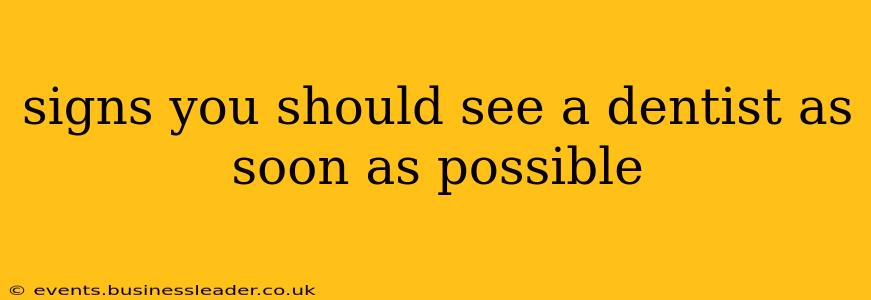Maintaining good oral hygiene is crucial for overall health. Neglecting dental issues can lead to severe complications, impacting not only your smile but your entire well-being. Knowing when to seek immediate dental attention is vital. This guide outlines key signs indicating you should see a dentist as soon as possible.
Severe Toothache: When Pain Becomes Unbearable
A persistent, throbbing toothache is a clear signal that something is amiss. This pain isn't just a mild ache; it's intense and often makes eating, sleeping, or even talking difficult. The cause could range from a cavity needing immediate attention to a more serious infection like an abscess. Delaying treatment can lead to the spread of infection, potentially requiring more extensive (and costly) procedures.
Swollen Gums or Jaw: A Sign of Infection
Swollen, red, or tender gums could indicate gingivitis, the early stage of gum disease, or a more serious infection. If accompanied by swelling in your jaw, this is a particularly urgent sign requiring immediate professional attention. These symptoms might be accompanied by pain, difficulty chewing, or even fever. Early intervention is key to preventing irreversible damage to your gums and jawbone.
Bleeding Gums: More Than Just Bad Brushing
While some minor bleeding during brushing is normal, persistent bleeding gums, especially if profuse, warrants a visit to the dentist. This is a strong indicator of gum disease, which, if left untreated, can lead to tooth loss. Your dentist can assess the severity of the gum inflammation and recommend appropriate treatment.
Loose or Broken Teeth: Don't Ignore Structural Damage
A loose tooth, especially if it's accompanied by pain or swelling, signals a potential problem, likely related to gum disease or an infection. Similarly, a broken or chipped tooth requires immediate attention to prevent further damage and potential infection. Your dentist can assess the extent of the damage and determine the best course of action, which might involve a filling, crown, or extraction.
Sudden Sensitivity to Hot or Cold: Beyond Normal Sensitivity
While some temporary sensitivity is normal, prolonged or intense sensitivity to hot or cold temperatures, particularly if it's new or worsening, may indicate a cavity, cracked tooth, or nerve irritation. This is a sign that the protective enamel layer is compromised and needs professional attention to prevent further complications.
Persistent Bad Breath: Beyond Normal Halitosis
While everyone experiences bad breath occasionally, persistently bad breath (halitosis) that doesn't improve with brushing and flossing could be a sign of underlying oral health issues, such as gum disease or infection. This shouldn't be dismissed – it might signal the need for thorough professional cleaning or treatment of an infection.
Sores or Ulcers That Don't Heal: Watch for Persistent Lesions
Mouth sores and ulcers typically heal within a week or two. However, if you have a sore or ulcer that persists for an extended period (longer than two weeks) or appears unusual in size, shape, or color, it's crucial to seek professional evaluation. This is to rule out anything more serious and to ensure appropriate treatment.
Clicking Jaw: TMJ Issues Require Attention
A clicking or popping sound in your jaw joint, accompanied by pain or limited jaw movement, could indicate temporomandibular joint (TMJ) disorder. TMJ issues require the attention of a dentist or specialist to prevent long-term problems. Ignoring this could lead to chronic pain and jaw dysfunction.
How to Find an Emergency Dentist:
If you're experiencing any of these symptoms, contacting a dentist immediately is critical. Most dental practices offer emergency appointments, and many online directories can help you locate a dentist near you who handles urgent cases. Don't hesitate to seek help; your oral health is too important to ignore. Early intervention often saves you time, money, and significant discomfort in the long run.
